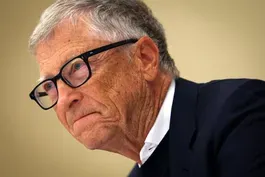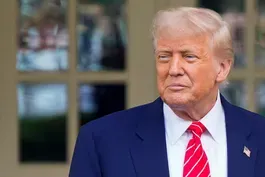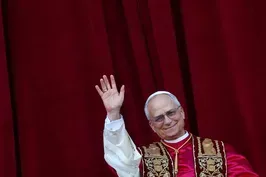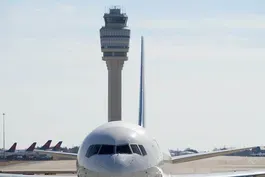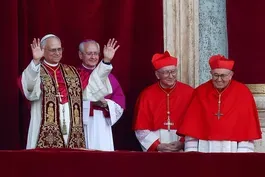
The impact Trump's tariffs are having on supply chains
Clip: 5/8/2025 | 11m 11sVideo has Closed Captions
The impact Trump's tariffs are already having on global supply chains and U.S. businesses
President Trump and British Prime Minister Keir Starmer announced a new trade agreement. Other countries, including China, remain open to negotiating with the U.S., but some of the tariffs are having real impacts on American businesses and their supply chains. William Brangham discussed more with Ryan Petersen, the founder and CEO of Flexport, a supply chain management firm.
Problems with Closed Captions? Closed Captioning Feedback
Problems with Closed Captions? Closed Captioning Feedback
Major corporate funding for the PBS News Hour is provided by BDO, BNSF, Consumer Cellular, American Cruise Lines, and Raymond James. Funding for the PBS NewsHour Weekend is provided by...

The impact Trump's tariffs are having on supply chains
Clip: 5/8/2025 | 11m 11sVideo has Closed Captions
President Trump and British Prime Minister Keir Starmer announced a new trade agreement. Other countries, including China, remain open to negotiating with the U.S., but some of the tariffs are having real impacts on American businesses and their supply chains. William Brangham discussed more with Ryan Petersen, the founder and CEO of Flexport, a supply chain management firm.
Problems with Closed Captions? Closed Captioning Feedback
How to Watch PBS News Hour
PBS News Hour is available to stream on pbs.org and the free PBS App, available on iPhone, Apple TV, Android TV, Android smartphones, Amazon Fire TV, Amazon Fire Tablet, Roku, Samsung Smart TV, and Vizio.
Providing Support for PBS.org
Learn Moreabout PBS online sponsorshipGEOFF BENNETT: President Trump and British Prime Minister Keir Starmer announced a new trade agreement today.
Many of the details are still being hammered out, but Mr. Trump said he believes it will be the first of many in response to his tariffs.
As William Brangham reports, other countries, including China, remain open to negotiating with the U.S., but it's far from clear how many will strike a deal.
DONALD TRUMP, President of the United States: This is a very special day because it's Victory Day, World War II, May 8.
WILLIAM BRANGHAM: On the 80th anniversary of World War II's Victory Day in Europe, President Trump sought to claim a different kind of victory in the Oval Office.
DONALD TRUMP: It's just incredible that day is the same day that we signed a tremendous trade deal for both countries.
WILLIAM BRANGHAM: Surrounded by British diplomats, the president announced the rough framework for a trade agreement with the United Kingdom, the first deal since he imposed sweeping tariffs on countries around the world last month.
DONALD TRUMP: The deal includes billions of dollars of increased market access for American exports, especially in agriculture, dramatically increasing access for American beef, ethanol and virtually all of the products produced by our great farmers.
MAN: I'm delighted to welcome you to say a few words.
WILLIAM BRANGHAM: From a factory in the U.K., British Prime Minister Keir Starmer, praised the arrangement, which is seen as a political victory for his center-left government.
KEIR STARMER, British Prime Minister: I wanted to come to you to announce that we have agreed the basis of a historic economic prosperity deal.
And that is a deal that will protect British businesses and save thousands of jobs in Britain.
WILLIAM BRANGHAM: While Trump and Starmer called the framework a deal, the specific details are unclear.
The agreement will leave the 10 percent tariffs Trump imposed on all nations, including the U.K., in place.
But it will eliminate existing 25 percent tariffs on British steel and aluminum.
In return, the U.K. will open market access for billions of dollars of U.S. goods, including beef, poultry, ethanol and other products.
The trade relationship between the U.S. and the U.K. is far more balanced than with many other countries.
By some measure, the U.S. even has a trade surplus.
And however this final deal shakes out, it could be more important for the U.K. than the U.S., for, while the U.K. is a relatively small trading partner for America, the U.S. is the U.K.'s largest.
And it's a critical market for some goods, including automobiles.
While the fundamental details are still being negotiated, those gathered today were quick to praise the president's dealmaking prowess, from members of his own administration.
HOWARD LUTNICK, U.S. Commerce Secretary: He's the closer.
He gets deals done that we could never get done.
WILLIAM BRANGHAM: To Prime Minister Starmer, who phoned in to the White House event.
KEIR STARMER: I want to thank you for your leadership on that, Donald, and for the way in which your team have negotiated this.
WILLIAM BRANGHAM: But amid the praise from one ally, threats of retaliation came from another.
The European Union announced today that more than $100 billion worth of U.S. goods could be hit with tariffs if trade negotiations fail.
The list includes agricultural products like meats and bourbon, along with manufactured goods like airplane and car parts and more, all this ahead of talks around the much bigger trade war between the U.S. and China that are happening this weekend in Switzerland.
It comes after weeks of Beijing resisting talks, saying it won't kneel down to a -- quote -- "bully."
Today, the president said he'd consider lowering the 145 percent tariffs he levied on China if the talks bear fruit.
DONALD TRUMP: We're going to see.
Right now, you can't get any higher.
It's at 145, so we know it's coming down.
I think we're going to have a very good relationship.
WILLIAM BRANGHAM: So, as the Trump administration continues these negotiations with trading partners, those higher tariffs are already having real impacts on American businesses and their supply chains.
Joining us now is Ryan Petersen.
He's the founder and CEO of Flexport, a supply chain management firm.
Ryan, thanks so much for being here.
Many of your clients are small American businesses.
How are they responding to these higher tariffs?
RYAN PETERSEN, CEO, Flexport: Yes, thanks for having me on.
It's tough for these businesses, the ones that are buying from China, I'd say, hit with a mix of paralysis and panic.
They're - - they don't know much what to do.
So a lot of them just paused importing goods from China.
We see a huge drop-off, in fact, a 60 percent decline in ocean freight from China to the U.S. since April 9 when this went live.
But businesses can't just pause.
I mean, at some point, they have to sell products in order to make money and pay their employees and stay in business.
So that's where the panic comes in and they're looking for some relief.
WILLIAM BRANGHAM: So that 60 percent pause is your clients saying, in the face of these tariffs, we're going to stop our orders from China temporarily and try to figure out what on earth is going on?
Now there's also some degree of scrambling.
So those who are continuing to ship goods, a lot of them have moved cargo into what's called a bonded warehouse.
So this is a warehouse that allows you to defer your payment of customs duties.
So you don't have to pay the tariffs until the goods leave the warehouse.
So there's a lot of kind of people putting goods into storage, expecting that duties are likely to come down.
And when they do, they will be able to pay that lower rate.
So, businesses are creative.
They find a way.
But, en masse, you see a 60 percent decline in shipments.
So, a lot of people are much more just kind of saying, let's just sit this one out and see what happens.
WILLIAM BRANGHAM: And what is the impact on us ports?
We know those are a critical artery for traffic in and out of the United States.
What's happening on American ports?
RYAN PETERSEN: Yes.
So the first to be hit is the West Coast, just because the transit time from China to the West Coast is so much shorter than to the Gulf and the East Coast.
So those have already seen a big drop-off.
We have seen about a 35 percent decline in L.A. Long Beach in number of containers being unloaded this week versus over the prior weeks.
So that's -- if your workers needed to unload ships, you're going to already -- the West Coast ports union has kind of come out and said -- in opposition to the tariffs.
Fewer truck drivers are going to be needed, warehouses, downstream.
It's going to flow through the whole logistics industry.
WILLIAM BRANGHAM: The president was asked about this at the White House today.
A reporter said, what about these slowed traffic at American ports?
And he seemed to imply that it was a good thing, that it was somehow less of us getting screwed over, as I think how he put it.
I take it your clients don't quite see it the same way.
RYAN PETERSEN: No, definitely not.
And, I mean, the reason you do global trade, the reason you buy stuff overseas is, it makes your company better off.
And you don't -- no one's compelling you to force you to buy goods.
You buy it because you can make money doing that.
And so it's really hurting these businesses, American companies that buy goods overseas, causing them to make less -- a lot less money and hurting their ability to hire people.
So, yes, it's definitely sad to see that.
You would like -- the president came in with promises of deregulating things, creating a kind of very pro-business environment, but these tariffs have done the opposite.
WILLIAM BRANGHAM: And what is the impact, as far as you can tell, been on consumers and the prices they pay?
RYAN PETERSEN: Those -- that's why we have seen a big increase, around a 10 percent increase in prices, for stuff that's sold on e-commerce, sold online.
And that's already taking place.
You will see it.
You go to buy things, you will see higher prices.
In fact, kind of famously, Amazon tried to show those higher prices and got called out by the president.
They didn't like that.
But you are seeing that companies, whether they show it or not, whether they break out the import duties on the checkout page, they are raising prices already.
WILLIAM BRANGHAM: There was what's called the de minimis exemption, and it was suspended recently.
Can you explain what that is and what the impact on that has been?
RYAN PETERSEN: Yes.
So, that's actually been one of the biggest impacts so far.
So, the de minimis exemption says that anything imported into the country that's less than $800 in value can be imported duty-free, as long as that item is being sent all the way to the final consumer, to your house.
And so that was ended on May 2 for goods from China.
And that's a huge impact.
There's almost four million packages per day being imported under the de minimis exemption; 70 percent of those are coming from China, and so a lot of companies.
Now, it's not all that it's being shipped from China.
A lot of companies actually had put their fulfillment centers in Mexico and in Canada.
And so, if you order from a lot of e-commerce Web sites, your goods are actually being shipped from Mexico to your house directly, and they're being shipped duty-free.
So, that's a huge impact.
Those companies now have to pay duties like everybody else.
And that's a big part of these price increases that you're seeing, especially in the apparel sector, people buying fashion, buying clothes.
A lot of that was there.
There's some famous Chinese e-commerce brands that were doing this, but a lot of American companies were using this as well.
WILLIAM BRANGHAM: You have likened tariffs to an asteroid coming at the American economy.
Where are we, in your view, of the trajectory of that asteroid?
Is it coming?
Has it hit?
Is it about to hit?
RYAN PETERSEN: I think it's still coming.
I think we're at the point where, if the administration changes course or starts to de-escalate on these 145 percent duties from China, which all indications are that they will do that, but it's a question now of how low do they bring it and how fast, when do they do that?
So, there's still time.
And there's still - - if they were to change course quickly and bring the tariffs way down, I think it would be a -- we wouldn't have to worry about this, but every week that goes by, you increase the chance of businesses failing en masse.
And some of the rumors are that they will bring it down to call it 50 percent duty on China.
Well, that's still really extreme.
I think a lot of companies will still be at risk of failure there.
But it's very hard to know what's the right duty level.
We have seen duties on the rest of world come in around 10 percent.
During this current pause, it's 10 percent.
That seems like a nonissue.
The market's been able to absorb that.
Volumes, in fact, from rest of world into the United States are up about 5 percent since April 9, when this was announced.
So it seems like companies are OK with the 10 percent.
So, somewhere between 10 and 145 is where the system seems to really break.
WILLIAM BRANGHAM: All right, that is Ryan Petersen, the CEO and founder of Flexport.
Thank you so much for being here.
RYAN PETERSEN: My pleasure.
Bill Gates on why he's donating his remaining wealth
Video has Closed Captions
Clip: 5/8/2025 | 11m 5s | Bill Gates on why he's donating his remaining wealth and his concerns about U.S. aid cuts (11m 5s)
A Brief But Spectacular take on building a brighter future
Video has Closed Captions
Clip: 5/8/2025 | 3m 41s | A Brief But Spectacular take on building a brighter future (3m 41s)
News Wrap: White House asks to remove deportation protection
Video has Closed Captions
Clip: 5/8/2025 | 6m 15s | News Wrap: White House asks Supreme Court to allow it to remove deportation protections (6m 15s)
Pope Leo XIV becomes first American to lead Catholic Church
Video has Closed Captions
Clip: 5/8/2025 | 2m 38s | Pope Leo XIV selected as first American to lead Catholic Church (2m 38s)
U.S. pushes for de-escalation as India, Pakistan trade fire
Video has Closed Captions
Clip: 5/8/2025 | 2m 58s | U.S. pushes for de-escalation as India and Pakistan trade fire and accusations (2m 58s)
What it will take to update U.S. air traffic control system
Video has Closed Captions
Clip: 5/8/2025 | 5m 22s | What it will take to update the aging U.S. air traffic control system (5m 22s)
What Pope Leo's election means for the future of the church
Video has Closed Captions
Clip: 5/8/2025 | 7m 53s | What Pope Leo XIV's election means for the future of the church and Catholics worldwide (7m 53s)
Providing Support for PBS.org
Learn Moreabout PBS online sponsorshipSupport for PBS provided by:
Major corporate funding for the PBS News Hour is provided by BDO, BNSF, Consumer Cellular, American Cruise Lines, and Raymond James. Funding for the PBS NewsHour Weekend is provided by...
